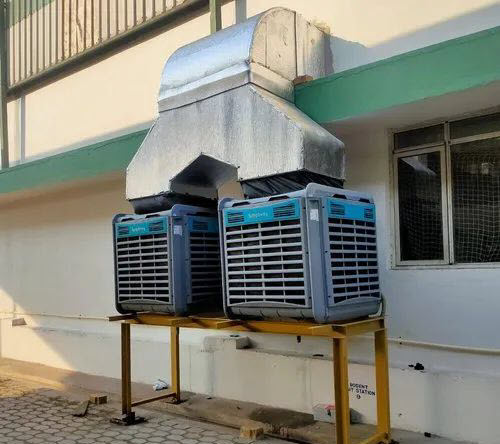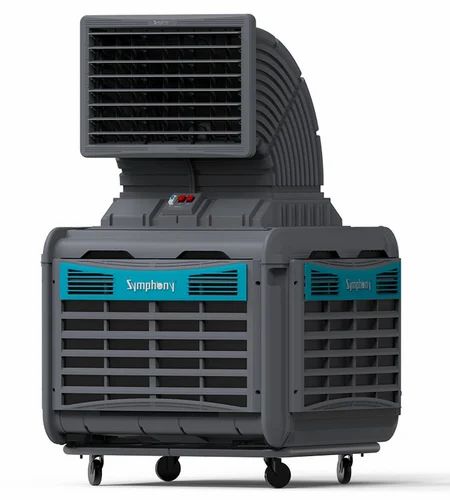Industrial Air Coolers: Essential for Modern Industrial Cooling

Industrial air coolers have become crucial for providing natural, 100% fresh, and healthy cool air to effectively cool industrial work floors. These systems, also known as industrial evaporative coolers or industrial ductable coolers, are used to cool large open spaces like factories, warehouses, and sports complexes economically with lower running costs.
Applications of Industrial Air Coolers
Industrial coolers operate on the principle of evaporative cooling, where hot air evaporates water on cooling pads, removing latent heat and cooling the air. These coolers are more energy-efficient and eco-friendly than traditional air conditioners and more powerful than typical exhaust fans. They are widely used in factories, workshops, sports arenas, warehouses, manufacturing plants, commercial offices, hangars, gyms, loading docks, large tents, garages, marriage halls, and religious congregations.
Types of Industrial Air Coolers
There are two main types of industrial air coolers: portable evaporative coolers and ductable evaporative air coolers. Portable evaporative coolers, also known as industrial portable air coolers, are ideal for industrial places and commercial areas like warehouses, garages, government offices, hostels, and banquet halls. They are also suitable for outdoor areas like patios, with capacities up to 20,000 CMH, covering areas up to 1,500 square feet per cooler.
Ductable evaporative air coolers, designed for large commercial or industrial complexes, distribute air uniformly through rectangular or spiral-shaped ducts, discharging air via nozzle diffusers or linear supply air grills. Types include roof-installed, wall-mounted, side discharge, and down discharge coolers with different airflow capacities per unit.
Top discharge air coolers are capable of cooling entire rooms or workshops. Down discharge air coolers, located on roofs, release cooled air downwards to cool entire homes or buildings. Side discharge air coolers are placed on the sides of buildings or roofs and discharge cool air through straight or U-bends.
Advantages Over Air Conditioning Units
Operating large industrial plants with air conditioning can be costly and inefficient in extremely high temperatures. Industrial air coolers offer continuous water supply through large tanks or float valve connections and perform optimally in open areas. They provide 100% fresh air circulation, promoting well-being and concentration. Although the installation cost of an evaporative cooler is similar to or slightly higher than an air conditioner, it remains a feasible cooling solution for most industrial buildings due to significantly lower recurring expenses.

Sizing an Industrial Air Cooler
The cooling power of an industrial air cooler is determined by its airflow, typically measured in cubic meters per hour (CMH) or cubic feet per minute (CFM). To calculate the required airflow, use the formula: CMH = Area of space (m²) x Height (m) x Air changes per hour. For example, to cool an area of 100 m² with a 10 m ceiling and 20 air changes per hour, the required airflow is 100 x 10 x 20 = 20,000 CMH.
Key Considerations for Buying Industrial Air Coolers
When buying industrial air coolers, consider factors such as case material and thickness, cooling pad size and thickness, motor wiring, and airflow volume. Fresh, thick case material ensures durability, avoiding issues common with recycled materials. Larger and thicker cooling pads enhance cooling performance. 100% copper wiring is preferable for reliability and efficiency, and verifying airflow volume ensures the cooler meets your requirements.
Tips for Installing an Industrial Evaporative Cooler
Proper installation and maintenance are crucial for optimal performance. Install coolers outside premises, on roofs or walls as required, and maintain at least 10 feet clearance from plumbing and exhaust vents. Regularly inspect the float valve to prevent overflow, and ensure 3 feet of clearance around the cooler for easy maintenance. Connect the water line to an outdoor water source with cut-off valves for winter draining. Before powering up, check for leaks and fill voids around the cooler. Seek professional help for electrical connections if needed.
How to Maintain Industrial Coolers
Regular maintenance of industrial coolers is essential. Change cooler pads regularly to prevent dirt and mineral buildup. Replace pads when airflow is reduced or if the pad material has become frayed. Choose durable materials like cellulose for longevity. Symphony’s Large Space Venti-Cooling solutions provide cool, fresh air and ventilation, enhancing employee comfort and productivity in manufacturing units and other industrial environments.
In conclusion, industrial air coolers are an essential component in maintaining a comfortable and productive environment in industrial settings. By choosing the right type and size of cooler, and adhering to proper installation and maintenance practices, businesses can ensure efficient, cost-effective cooling for large spaces. Symphony’s Large Space Venti-Cooling solutions offer significant benefits, making them a valuable addition to modern industrial cooling systems.
